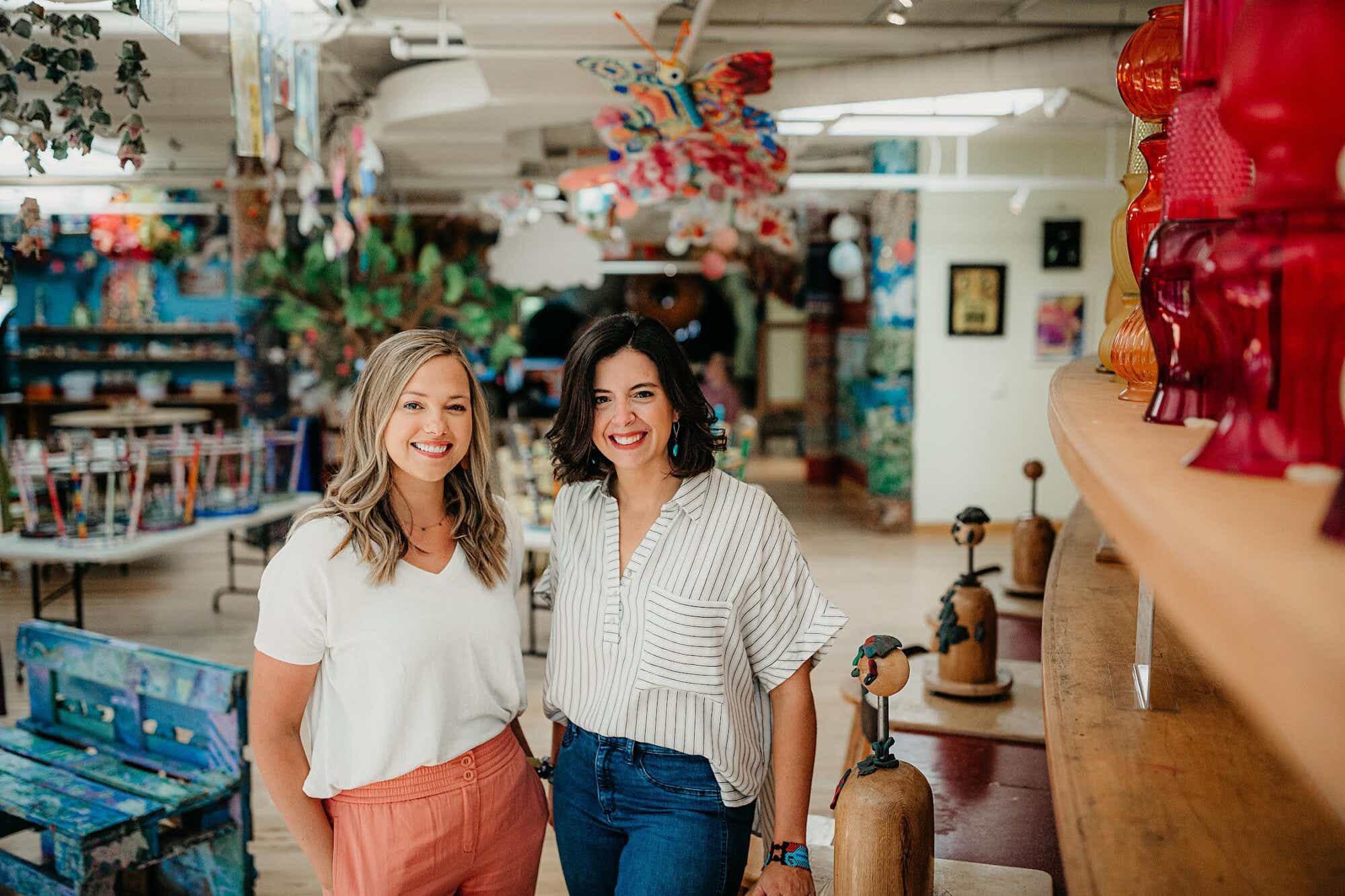When you’re going through a challenging time (whether it’s grieving the loss of your husband or juggling kids during a global pandemic), sometimes you wish you had a set of extra hands. And that’s exactly how the three entrepreneurs below felt. So they hatched brilliant business ideas during their own life-defining moments. The results? Their inventive concepts are disrupting the way we think about mental health and also reinventing outdated ways of coping with loss.
And what do the three women have in common? Well, last year, we teamed up with our friends at Ally to celebrate female trailblazers making waves in their industries through the Daring to Disrupt contest. (We gave out more than $70,000 in prize winnings across the ten female leaders who really stood out to us.) So, we’re checking in with three of the winners — the ones we like to call mental health warriors — to see how they’re continuing to make an impact in the world, what they’re cooking up for the future, and how winning the contest has impacted their companies.
Having children during the pandemic led two moms to launch a mental health company focused on children.

Special-ed teacher Abbie Pabon gave birth to her second daughter on March 11th, 2020 — the day the world unofficially shut down. “I went through some pretty intense postpartum anxieties and started going to therapy to help with having a newborn at the beginning of a global pandemic, which so many people have experienced in the last couple of years,” she says.
Pabon found solace talking about her experiences with her high school friend, Emily Enstad, a licensed therapist who lived in the same Wisconsin town. They bonded over how the techniques and tools Pabon was learning in therapy could apply to their own kids and professions. “We thought, ‘Isn’t it interesting that this isn’t something we feel like we can talk about with any of our friends?’ But we should be able to feel like that,” Pabon says. When Enstad also gave birth to her second child in November 2020, the two took advantage of late nights and nap times to launch a business inspired by their conversations and called it Present Not Perfect.
The mission? To support families’ emotional wellness and empower the next generation of mindful, creative, and resilient kids. “That inspiration came from wanting to provide practical hands-on tools that families can use to foster social and emotional literacy at home and to just make that more accessible for families,” says Enstad.
The two moms invented what they call “Calm Kits” — miniature playsets that feature all-natural playdough or sensory sand (a hypoallergenic option). Each one is rooted in metaphors aimed at promoting emotional literacy in children: One bestseller, the Unicorn kit, is all about self-worth and includes a tag that asks children to think about what makes them unique. “It’s aimed at empowering kids to be confident about their differences and what makes them special,” says Enstad.
The founders are industry disruptors who take the weighty topic of mental health and make it more accessible, playful, and creative. “It doesn’t have that clinical, stuffy feeling that we sometimes get when we do look up resources for mental health,” says Enstad. “A lot of people wait to receive mental-health support until late in adulthood, and say they wish they would’ve learned these things when they were younger.”
Together, Enstad and Pabon are paving a path for families to connect through a fun activity while teaching skills that help with emotion regulation and mindfulness. “Taking care of our physical health is normalized in our society,” says Enstad. “And now we’re seeing more of a push to make mental health a priority, as well.”
Winning Ally’s Daring to Disrupt contest helped set Present Not Perfect on a path toward growth. “We’re very grateful to be included in a group of women who are really impactful in everything they’re doing,” says Pabon. “Of course, we believe in the company,” says Enstad. “But the contest gave us a boost of confidence to take our next steps and not be as scared — because they believe in us.”
How her husband’s passing inspired a grieving widow to ease the logistical burden of loss and divorce for others.

When Jasmine Hathaway’s husband passed away in 2015, she became totally overwhelmed. Not only was she emotionally dealing with the loss of her loved one, she soon realized all of the administrative tasks and paperwork that needed to be completed were all-consuming.
“I’m naturally very organized, detail-oriented, and tenacious,” says Hathaway. “But in the midst of profound grief, it felt like those skills had left me. I had brain fog, I wasn’t sleeping well, and the last thing I wanted to do was call a bunch of strangers and tell them the worst news of my life just to close some accounts.”
During this tumultuous time, what Hathaway wished she had was someone to listen and help her prioritize her to-do list. So, she created the type of company she was looking for herself — Compass Coordinators.
“I originally thought that people would want to just hand things off to me. What I learned is that it’s sometimes more valuable for me to listen to what’s going on in their world and create a plan for them,” says Hathaway. “I lay out their tasks in a clear, prioritized order and break big things down into manageable chunks. Then my client can work through them and get the satisfaction and feeling of control, at a time when many other things feel out of their control.”
According to a recent Gallup poll, fewer than half of U.S. adults have a will, which is one of the best ways to prepare for tragic life events in advance, explains Hathaway. You should also think about what’s called a “digital estate,” she says. “We create so many accounts and have so many different passwords. How would someone access it all if needed?”
Hathaway’s ultimate goal is to make sure her clients know they’re not alone. “Feeling overwhelmed is completely normal, and there are people who can help you get through this. I might even be one of them,” she says. “Grief can be such a lonely experience because no one goes through loss in exactly the same way. It can be easy to feel like no one else understands. But you’re not alone — surround yourself with love and support and just take it one day at a time.”
This year, Hathaway’s ready to level up her company’s reach. Thanks to winning Ally’s Daring to Disrupt contest last year, she’s been able to grow her business and develop a few strategic partnerships. “So far, I’ve used the prize money to really level up my marketing. That’s still the biggest challenge I’m facing: getting the word out about my services so when people are overwhelmed by logistics, paperwork, and bureaucracy after a loss, they know that Compass Coordinators can help.”
Our friends at Ally are championing the future of inspiring and innovative female entrepreneurs, like Emily, Abbie, and Jasmine, through their Daring to Disrupt platform. Daring to Disrupt showcases the stories of women who are changing industries by challenging the status quo. Want to meet more female disruptors? Starting March 8 (on International Women’s Day!), we’ll be introducing you to eight new passionate women who are breaking glass ceilings and shattering outdated ways of thinking. Stay tuned for more.












